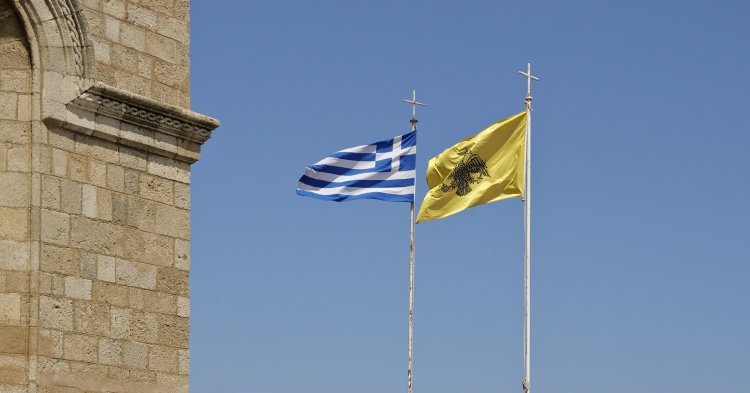The Church represents the word of God in our physical world; however, I could never understand how God can have such a politicized word.
It is an undeniable truth that throughout European History, clergies have been maintaining high levels of political power and influence. In medieval times, the Church had the power to establish the kingship of an ambiguous successor, while today, in some parts of the world, it can still substantially affect the outcome of democratic elections. Hence, it is not surprising that political leaders frantically seek to secure the support of the Church, especially in deeply religious nations. And as the facts prove, Greece shows the example of such a nation. From the very beginning of the Greek modern History and up until today, the Greeks have maintained a very strong relationship with God and religion. Our culture, social behaviors, beliefs, and norms are deeply affected by God-fearing convictions, and skepticism is not to be considered as our national sport. However, the wave of progressiveness of the ‘60s and 70’s did not leave Greece unimpacted. This wave marked the beginning of a slow reconsidering process which fruits were bared until today and illustrated by what sociologists call the “Generational Gap”.
Today, average Greeks have retained their belief in God and religion, but the strength of their belief and the dedication put into their faith tend to lower for the younger and the more educated. Two folds remain and shape this continuum: the progressives on the one side, relieved from the presets of religion, and the conservatives on the other side, guided by the word of God.
Conflicting ideas
The separation of the State and the Church has been, for years, a source of dispute in the polarized on that matter country of Greece. On the one hand, the progressive part of the people, keen to question the status quo of this long-lasting relationship, expects to see our State’s decisions unprejudiced by ancient dogmas and uninfluenced by puritanism. On the other hand, the conservative portion of our population - deeply religious – is remarkably influenced by the word of the Church’s leaders and maintain the conviction that their word should act as law for the government.
For many years, these conflicting ideas has been left forgotten in the dusted closet of history.
The missed separation
In 2015 and as Greece was exiting the fifth consecutive year of a deep economic crisis, the accumulated indignation of the population led to the rise of a left-wing political party to power. Much more progressive than the previous governments, SYRIZA’s radical ideas indicated that time might had come to solve this dispute once and for all. As expected, at the third year of its governance, SYRIZA attempted to reconfigure the Article 3 of the Greek Constitution, according to which Greece maintains a constitutionally recognized and official state religion. Despite their effort to be historically recognized as the political party that initiated the separation of the State and the Church in Greece, the amendments of the party were characterized as indecisive and their attempt accused to be a political maneuver to keep a part of the voters, lost by the economy’s poor performances.
The reason lying behind such characterizations was the fact that the amendments addressed the issue inadequately. More specifically, the separation was based on two core shifts: the first one planned the alteration of a specific part of the Constitution, in order to make Greece a religion-neutral nation, instead of one with a prevailing religion. The second and most criticized shift, concerned an amendment declaring that the priests would no longer be paid as public servants, but through a special account managed by the Church. However, this “special account” would still be financed by the State. From that point of view, as the amendments were setting aside many crucial aspects of the issue, SYRIZA’s attempt seemed like nothing but an effort to please both contradicting opinions of their voters.
Time passed and elections followed before SYRIZA manage to pass their amendments. On the 7th of July 2019, the right-wing party of New Democracy, dethroned SYRIZA from the country’s steering wheel. A few months later, SYRIZA’s amendments were discussed and voted by the Greek Parliament.
However, as one could have expected from the governance of the conservative party New Democracy, the fate of these amendments was predetermined. The Constitution remained unchanged and still asserts to this day the Eastern Orthodox Church of Christ as Greece’s prevailing religion. Of course, as in every non-despotic country, Greece’s Constitution recognizes the right to the freedom of belief.
The true threats
The truth is that this part of the Greek Constitution is considered of less significance. As experts of the field claim, “it holds just an informative character, which simply describes an arithmetic prevalence”. However, and beside the fact that Greece’s Constitution respects every religion, some of its statements can pose a substantial threat to freedom and democracy.
Article 14 testifies as an accurate example of this threat. According to this article, “the foreclosure of a newspaper can be, exceptionally allowed, if it has been ordered by the district attorney, in the case that its content insults the Christian or any other known religion”. Such a constitutional statement could easily be characterized as a gap in the protection of the freedom of speech, and under extreme circumstances even a potential threat to it. However, the real threats of the close relationship between the State and the Church on the Greek society are not found in constitutional sources, but in the substantial influence that the Church’s word obtains over the public and over political leaders.
A distinctive example of this influence was illustrated by the government’s management of the COVID-19 pandemic management, more specifically in its stance towards the Church. In the Eastern Orthodox religion, believers should regularly “receive” the “body” and the “blood” of Jesus Christ, in the form of bread and wine. The reception ritual involves that the priest offers a spoonful of bread and wine to each believer, using the same spoon for all them. Now, any rational person, without excessive knowledge of epidemiology, understands that this ritual can significantly enhance the dispersion of the virus. However, none of the representatives or members of the governing party ever clearly stated his or her stance towards the issue. This avoidance, by revealing the profound reluctance of the government to enter any form of conflict with the Church, is an accurate example of the influence of the Church over the public opinion and politicians. Quite unexpectedly though, this governmental silence was harshly criticized by a substantial part of the Greek society.
Another worth-mentioning aspect of the issue is how statements of certain Church’s representatives foster racism and nationalism, hatred, and misanthropy in society. Such discourses are infrequent and not unanimously adopted by the Church, at least not openly. However, in an over-tensed Greece – partly because of the economic crisis, marginalized groups of people like refugees or members of the LGBT+ community can easily be scapegoated. The government’s avoidance to clearly declare beliefs fostering discriminations as unacceptable - not only through statements, but also through legislative decisions – depicts yet another accurate example of the Church’s political power in Greece.
Unfortunately, a society where politicians prioritize the political cost of an opposition to the Church’s imperative decisions over their appropriateness, according to objective criteria, is condemned to anachronistic behaviors and beliefs. As it seems, the Greek politicians value their political power and position more than the welfare of the Greek society.
The separation of the State and the Church in Greece should not be considered as a “radical atheists” demand. It is a necessity for the maintenance of stability and freedom in the Greek society and for the protection of the future generations’ open-mindedness. As accurately illustrated in the words of Thomas Jefferson: “Erecting the wall of separation between the State and the Church is absolutely essential in a free society“.


Follow the comments: |
|
